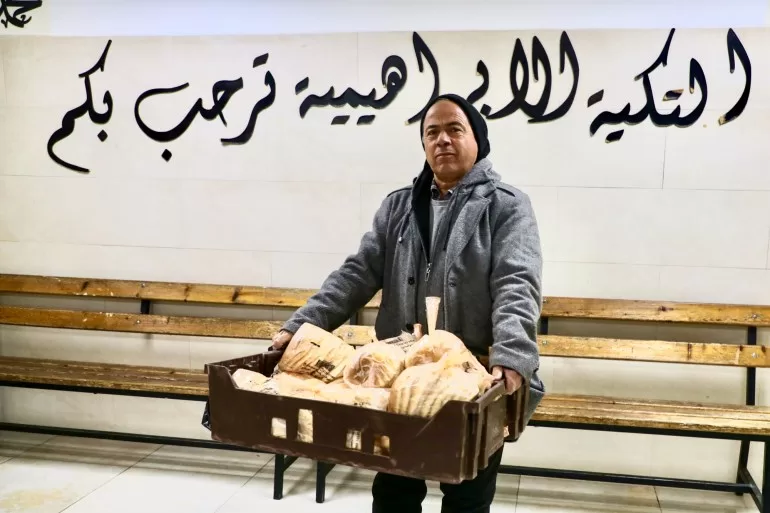A tikkiyya is a charitable foundation in the Islamic tradition, set up to offer shelter, food and help to those most in need.
The 37-year-old oversees the Tikkiyya’s cold storage, a vital part of the supply chain, he explains, if thousands of meals are to be prepared a day.
Al-Jabari believes fervently in the mission he volunteered in for three years before being hired a year and a half ago.
He explains his role to Al Jazeera, how the following day’s needs are determined so that every family that came there had enough food, irrespective of its size, to get them through the day.
“We work hard to provide enough food to everyone who comes here,” he adds, gesturing around at the team of nine other permanent staff and what looks like countless volunteers.

The Tikkiyya has been running since the 13th century, although it is now beside the Ibrahimi Mosque, not in its original location.
In 1963, the building it was in was demolished and the foundation had to move, only to move again in 1983 to its current location, metres from an Israeli checkpoint but still accessible to those who need it.
Hebron, like many other cities in the occupied West Bank, is hamstrung by Israeli checkpoints that choke off movement for the people living there and make transport between cities nearly impossible.
But the Tikkiyya team perseveres, day after day.
Keeping people alive
Before October 7, when Israel launched a relentless assault on the Gaza Strip in retaliation for an attack by armed Palestinian factions out of Gaza on Israeli territory, the Tikkiyya provided about 1,000 meals a day.
It relied on donations to allow it to make that much food, and the Palestinian Authority’s Ministry of Awqaf and Religious Affairs provides funding for salaries and administrative costs.
That was, until the war on Gaza caused a chain reaction of economic distress, with tens of thousands of workers from Gaza trapped in the occupied West Bank and unable to go home or work while trade has ground almost entirely to a halt.

The Palestinian Authority has had to shore up the Tikkiyya’s funding in light of the thousands of extra hungry mouths that need to be fed.
Like 55-year-old Hatem Dawoud al-Rajabi and his family who have been relying upon the Tikkiyya since al-Rajabi’s work as a plumber dried up after the war broke out.
“I found no alternative but to go to the Ibrahimiyya,” he said, adding that he has a wife and 11 children.
Thankfully, he said, “the Tikkyya helps people”, with him and his family one among many.
Hebron, he adds, is a “city where nobody ever goes to bed hungry”, an adage about the city.
Bubbling away
The Tikkiyya team is determined to not let people like al-Rajabi down, and they bustle around the different parts of the building, taking care of administrative tasks, setting up the dining areas for women and men, preparing the containers that some families will take their food away in.
Those families start lining up as early as 10am, so the team starts work between 5:30 and 6am, right after dawn prayers.
On the day Al Jazeera visited, the menu was chicken, soup and fresh bread. Different days bring different meals, depending on seasons, availability and what has been donated. Some days the team cooks beef, other days sheep, and some days simpler fare like beans or soup.

In the spacious kitchen with its enormous cooking cauldrons and utensils, the chefs bustle around preparing everything they would need for the day.
The teams are distributed according to their tasks. Some are putting the pots in position while others are preparing the chicken and others are lighting the stoves.
One of the Tikkiyya’s longer-serving employees, 56-year-old Ataya al-Jebrini is looking around happily, taking in the activity.
He spent 23 years on the payroll, then decided to volunteer his time for free for the past nine years.
Despite the decades, al-Jebrini explained, the nature of his work has not changed significantly, with the same daily rhythm taking over every morning at the crack of dawn and the frenetic activity taking the team through the day.
Hazem Mujahid, the Tikkiyya director, estimates that the operating costs are about 35,000 shekels ($9,700), a figure that is expected to double as Ramadam approaches.
Responsibility for raising that money falls to the head of the tikkiyya’s supervision and support committee, where Wissam al-Kurdi is responsible for maintaining the Tikkiyya’s 745-year-old mission.
He has already begun looking for donors to get the Tikkiyya through the days to come.

